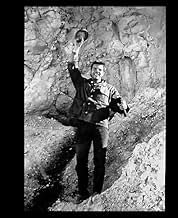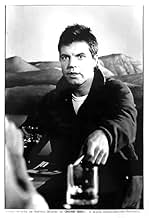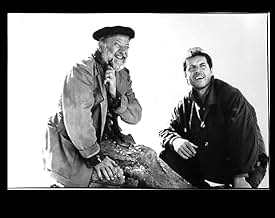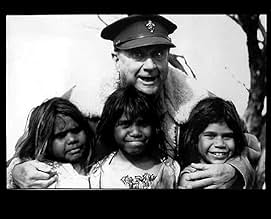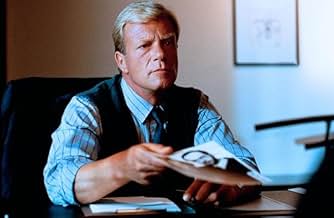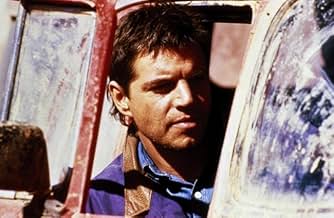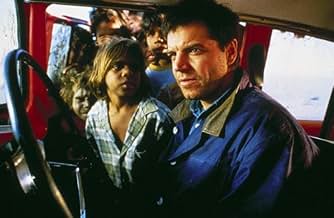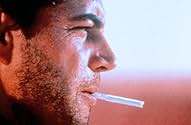AVALIAÇÃO DA IMDb
6,4/10
576
SUA AVALIAÇÃO
Um cinegrafista na Austrália descobre evidências de que seu pai filmou um teste nuclear que expôs aborígenes a radiação. Ele busca um segredo que, se verdadeiro, revela que seu governo já ma... Ler tudoUm cinegrafista na Austrália descobre evidências de que seu pai filmou um teste nuclear que expôs aborígenes a radiação. Ele busca um segredo que, se verdadeiro, revela que seu governo já matou para manter em sigilo.Um cinegrafista na Austrália descobre evidências de que seu pai filmou um teste nuclear que expôs aborígenes a radiação. Ele busca um segredo que, se verdadeiro, revela que seu governo já matou para manter em sigilo.
- Direção
- Roteiristas
- Artistas
- Prêmios
- 4 vitórias e 6 indicações no total
- Direção
- Roteiristas
- Elenco e equipe completos
- Produção, bilheteria e muito mais no IMDbPro
Avaliações em destaque
I'm surprised to find that this film has been seen (and appreciated) in America. It wasn't all that successful in Australia, most people felt (like me) that it was a great plot idea let down by the writing (I also found Colin Friels' performance a little flat - and I thought the film went a bit heavy on the anti-American angle).
However, these reviewers don't seem to quite know the background to the film. Britain's first atom bomb was tested on Monte Bello island in the Indian Ocean in 1956, but the next series of tests were carried out at Maralinga in the South Australian desert, at the invitation of the Australian government. There was nothing secret about this, the government actually used the tests to promote itself as looking after Australia's security. Sounds very familiar! At the time the movie was made (1987), there was a big issue over the radiation levels that Australian troops had been exposed to during the tests, and the effects on their long-term health (much the same as for US troops during the Nevada tests.) There were also questions raised about how much effort had gone into evacuating the local Aborigines from the area both before and after the tests. This is the issue that forms the background to the movie, but it is really about drawing parallels between Australian subservience to Britain in the 50's and to the USA in the 80's, and just how much this is really in Australia's interest.
The debate back then was over the US satellite facilities at Pine Gap, today it is over support for the war in Iraq. The movie should have been topical and relevant, then and now, but it isn't because it is done with such a heavy hand. The scene where Colin Friels and Donald Pleasance are suddenly ambushed by US troops in the middle of the Outback is just stupid. The scene where he is making the hot dog commercial is supposed to be about the domination of American culture, but it doesn't work either. The line where he is talking to the rat in his kitchen when he gets home, probably looked good on paper, but should have been cut from the movie. The final scene should be brilliant, but isn't. When Colin Friels says, 'Hey, wait a minute...' he shouldn't say anything! His face should say it all.
My opinion - this film isn't great, but it could have been, which is why I found it so disappointing. Close, but no banana - damn, another Americanism!
However, these reviewers don't seem to quite know the background to the film. Britain's first atom bomb was tested on Monte Bello island in the Indian Ocean in 1956, but the next series of tests were carried out at Maralinga in the South Australian desert, at the invitation of the Australian government. There was nothing secret about this, the government actually used the tests to promote itself as looking after Australia's security. Sounds very familiar! At the time the movie was made (1987), there was a big issue over the radiation levels that Australian troops had been exposed to during the tests, and the effects on their long-term health (much the same as for US troops during the Nevada tests.) There were also questions raised about how much effort had gone into evacuating the local Aborigines from the area both before and after the tests. This is the issue that forms the background to the movie, but it is really about drawing parallels between Australian subservience to Britain in the 50's and to the USA in the 80's, and just how much this is really in Australia's interest.
The debate back then was over the US satellite facilities at Pine Gap, today it is over support for the war in Iraq. The movie should have been topical and relevant, then and now, but it isn't because it is done with such a heavy hand. The scene where Colin Friels and Donald Pleasance are suddenly ambushed by US troops in the middle of the Outback is just stupid. The scene where he is making the hot dog commercial is supposed to be about the domination of American culture, but it doesn't work either. The line where he is talking to the rat in his kitchen when he gets home, probably looked good on paper, but should have been cut from the movie. The final scene should be brilliant, but isn't. When Colin Friels says, 'Hey, wait a minute...' he shouldn't say anything! His face should say it all.
My opinion - this film isn't great, but it could have been, which is why I found it so disappointing. Close, but no banana - damn, another Americanism!
One of the 80s best Aussie films. It is a stunning piece of filmmaking. Take it from me, this is worth crawling over broken glass to see.
Great electronic, ethereal music.
Interesting and involving as this film is, one feels something is missing from it. I really like this film, the photography out there in the dunes with those crystals (rocks) is a beautiful image etched in my mind. Friels and Thompson, who you don't see nearly enough in this, do us solid, and other performances grab us too, like the creepy Fachney, a seedy ASIO soy who even shows up as an extra in a commercial, Friels's character happens to be filming in the film's starting, a scene I loved, where the hot dog ad, all goes all to s..t Ground Zero just doesn't achieve full standing, or doesn't hit it's mark, and I think this largely is due to the screenplay structure, or not enough information was poured into the script. Regardless, it's still a riveting view. There's moments in this film, some quite creepy, that stay with me, like that nosey neighbour, prying on Friels all the time, through the gap of open door, and why is it, Friels has to use a boot to open his door of his apartment/work space, instead of just using his key. It's final scene really throws ya, where initially Friels lucks out again, with with those ASIO people. Quite a fine Aussie film, and one that should be seen, especially for people personally close or took a vested interest in the Maralinga affair, and those British A bombs. Great fitting music scores, which are eerily memorable.
An intelligent thriller is a rare thing these days, at least on the evidence of this well-intentioned but pedestrian story of nuclear paranoia and bureaucratic conspiracy, in which an innocent Australian cameraman uncovers a few radioactive skeletons in the closet of his country's atomic testing program. The Aussie government apparently has been hiding the details about native Aborigine victims of radiation fallout, but because the secret is out at the beginning of the movie there's no surprise and very little suspense: each new development in the already linear plot is introduced in sequence, with handy cues of ominous music to help viewers connect the dots. The script relies too much on convenient expository bulletins (television news broadcasts; telephone answering machine messages; home movies and so forth), and identifies too strongly with its hero, who like any unassuming TV cameraman is transformed into James Bond when under stress. A strong cast and attractive wide screen photography can't hide the wasted opportunity to expose an ugly true story and turn it into compelling fiction.
Você sabia?
- CuriosidadesAfter this movie was made, this film was specially screened at England's House of Commons Parliament for the British Government of the day.
- ConexõesFeatured in Ground Zero: An Important Story - Jack Thompson in Conversation (2008)
Principais escolhas
Faça login para avaliar e ver a lista de recomendações personalizadas
- How long is Ground Zero?Fornecido pela Alexa
Detalhes
Bilheteria
- Orçamento
- AU$ 7.000.000 (estimativa)
- Tempo de duração1 hora 49 minutos
- Mixagem de som
- Proporção
- 2.35 : 1
Contribua para esta página
Sugerir uma alteração ou adicionar conteúdo ausente

Principal brecha
By what name was Segredos Nucleares (1987) officially released in Canada in English?
Responda
